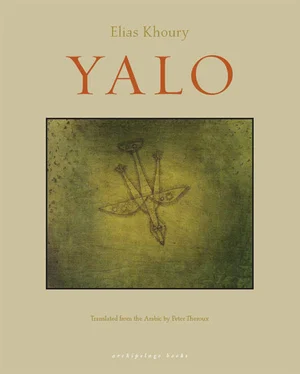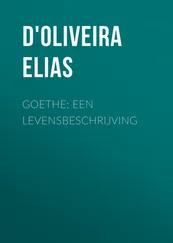My grandfather told me not to emigrate. But I left for France, and that was the cause of all my troubles. The truth is that I was tired, tired of the war, and poverty, and my mother. My mother had become like a maniac with her mirror and the ghost of my grandfather, whom she saw every night in her dreams. It was Tony’s idea to emigrate, and I was enthusiastic about it. The name on my identity card is Daniel Abel Abyad. But people call me Ibn Jal’u. I was born in Beirut in 1961. I worked as a guard at the Villa Gardenia, which is owned by Monsieur Michel Salloum, in the village of Ballouna in Kesrouan.
I started my new job at the end of the war. My friend Tony Atiq and I traveled to France. We fled after we stole the money from the Georges Aramouni Barracks in Achrafieh. In Paris we stayed in a small hotel in Montparnasse. It was a great place, and it was the first time in my life I had my own room. In our house I slept in my grandfather’s room. My grandfather decided it would be that way when I was five years old, when he ordered me to move from my mother’s room to his. He said that the regimen in the house had to be strict: men in one room, women in another. So I moved in with him, but nearly every night I would sneak into my mother’s room to sleep in her bed.
We stayed in the hotel for about two weeks. We did nothing. We strolled around Paris, ate in restaurants, and drank French wine. Once we went to the Pigalle district, and a French woman, I mean a whore, made me wear a condom when I slept with her. I hated it, and something almost happened then that never happened in all my life, which was going soft at the last moment. I hate wearing a condom. But here in France they force people to do that out of fear of AIDS.
I began to worry because we weren’t working. Tony reassured me saying that he would get in touch with some of our friends here to find us work, but we were in no hurry because Tony had plenty of money.
Then Tony deserted me.
I don’t know how or why. I didn’t even realize he was playing a trick on me. I was walking along with him, following blindly, and suddenly I noticed that he had disappeared. So I was alone in Paris, without a single franc.
The proprietress of the hotel, a respectable Frenchwoman, took pity on me. She communicated with me through gestures and with a few English words, and managed to explain that Tony had paid her for two nights for me before he left the hotel. She added that she was prepared to let me stay one additional night for free, and would give me breakfast for three days; after that I was on my own.
Tony spoke French but I didn’t. When that woman started talking to me I felt like she was throwing stones at me. I had that feeling until I was back in Lebanon. In France, I understood that words were like stones. When you don’t understand the language, it is as if people are stoning you or torturing you. With the Syriac language it was different. True, I did not understand it, but I felt it and I knew that I could get between the words and sentences to grasp some meaning. My grandfather used to talk to my mother in Syriac and she would answer him in Arabic and told him to stop speaking Kurdish. It really provoked him. My grandfather was Kurdish, no, what should I say, he was not Kurdish, but he spent his childhood among the Kurds after the Ain Ward massacre, and he spoke their language. Then he emigrated to Beirut and worked in tiling, like so many of the Syriac youths who ended up in the Syriac Quarter in Mseitbeh in Beirut. It was in Beirut that he began to learn the Syriac language. He had not studied the colloquial Suryoyo that people used every day; he learned the formal liturgical language. When he became a cohno , he began to use the formal language, but with me he spoke colloquial Arabic with some Syriac words sprinkled in. When my mother called him “the Kurd,” it got under his skin, especially in his last days when he would have long crying fit, and my mother didn’t know how to soothe him. After my grandfather became a cohno he stopped eating meat. Then his wife died of cancer and he became very inflexible, almost unbearable, especially in matters of diet, cleanliness, and morals.
My grandfather’s inflexibility caused a major problem in the family. I had not paid much attention to it, but my grandfather told me how Elias al-Shami had been castrated, and my mother went crazy. She went crazy not because my grandfather had castrated her lover, since that didn’t concern her, but because he had told me about it and exposed her.
I don’t know how, but when I heard the story, I had a feeling that I’d heard it before. Mr. Elias had been a presence in my life, even though he rarely visited us. My mother would take me to the amusement park, and he would be there. I would always ride the Ferris wheel, and they’d stay down below. I would spend an hour or two looking out at the sea and the city from above. As the world twirled around, they sat down there drinking coffee and talking.
Once, I got lost. I remember it now as if it had happened to another person. I had thought that the idea of this other person who resembled me was just a childhood thing, I mean, when I remember my childhood, I feel that the child who was me, was some other person. But now, after my experiences being imprisoned and tortured, I began to see Yalo’s whole life as if it were someone else’s. I do not know how to describe these feelings, sir, but they are true feelings. I look at myself in the mirror of my self and I see a different man and fear him, his thoughts, and his acts. No, I do not say this to dodge my responsibilities, because I know that I am now paying the price of my sins, and I seek the pardon of Almighty God.
I do not seek the pardon of people, nor do I write these lines in order to gain the favor of his honor the judge, because life no longer concerns me. I know that I will be sentenced to death on the charge of planting explosives and killing innocent people, but I am innocent, I swear to God, innocent. Even so, I will accept most willingly the sentence handed down against me. I tell myself that this is my destiny, that it was written well before I was born. I can’t do a thing. I see my grandfather crying before me and I ask him to intercede with me with St. Ephraim the Syriac. All I ask for myself is mercy and relief in the next world.
I got off of the wheel, or the whirl — I don’t know what that ride is called — and could not find my mother or Mr. Elias below. I began crying and people gathered around me and asked me whose child I was and where I lived. I didn’t know how to tell them where I lived, but I told them I was from the Abyad family and that we lived in the Syriac Quarter, that’s all I knew. I kept on crying among people who didn’t know what to do with me. I was crying. Then someone I didn’t know recognized me and said, “That’s the priest’s son,” and took me home in his car. And there was my grandfather, and the scandal that bound me to him. It was then that my grandfather realized my mother was still involved with the tailor.
In Paris I was very afraid. Suddenly I found myself on the street in a city where I knew no one and didn’t know the language. So I resorted to the art that I did know. I took a piece of cardboard from Madame Violette, who ran the hotel, and wrote in beautiful Naskh script this phrase: “I am a Lebanese youth, homeless and alone. I seek mercy because I cannot afford the price of a crust of bread.”
I sprawled out with my cardboard in the Montparnasse Métro station and stayed there several days, and all I had to eat was a dry piece of bread given to me by a French tramp, homeless like me, drinking wine straight from the bottle, his body giving off a putrid smell. It was there M. Michel met me and saved me. He brought me back to Lebanon, gave me work, treated me well, God bless him, and I betrayed his trust. A man who trusted me with his home and his wife and yet I did not deserve his trust. Instead of being his watchdog, as he asked of me, I became a stray dog and started a life of my own. I began by spying from the pine forest located below the St. Nicholas Church.
Читать дальше












